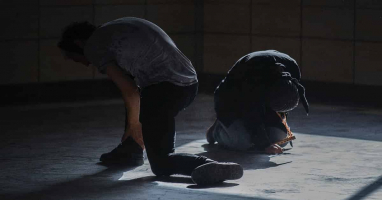I wrote this article in Japanese and translated it into English using ChatGPT. I also used ChatGPT to create the English article title. I did my best to correct any translation mistakes, but please let me know if you find any errors. By the way, I did not use ChatGPT when writing the Japanese article. The entire article was written from scratch by me, Saikawa Goto.
Introduction
Movies and books covered in this article

I will write an article about this movie/book
What I want to convey in this article
I think it’s amazing to see people who can still say “I want to live” even in the face of a difficult reality.



I, who can only live apathetically and lazily, do not have the energy to face the harsh reality.
Three takeaways from this article
- Why the protagonist had to choose a nomadic lifestyle.
- Filmed by getting inside the actual nomadic lifestyle people.
- Emotional attachment to the “home” while living.



I realized that there are people who live their lives in this way, for better or for worse.
Self-introduction article


Please refer to the self-introduction article above to learn about the person writing this article. Be sure to check out the Kindle book linked below as well.


Published Kindle books(Free on Kindle Unlimited)
“The genius Einstein: An easy-to-understand book about interesting science advances that is not too simple based on his life and discoveries: Theory of Relativity, Cosmology and Quantum Theory”
“Why is “lack of imagination” called “communication skills”?: Japanese-specific”negative” communication”
The quotes used in this article are based on notes taken at the movie theater from movies in Japanese and are not direct quotes from the foreign language original movies, even if they exist.
Could You Think You Want to Live, No Matter What Situation You’re in?
I have Always Been Devoid of the Desire to Live


I’ve been living my life by inertia without any particular interests, goals, or dreams. I don’t have any hobbies that I’m passionate about or a sense of purpose that I want to achieve.


It’s been like this since I was a child, always feeling like I’m just passing the time. I used to actively think about wanting to die, but lately, I haven’t had such thoughts. I just go through the motions of each day without much pain or difficulty, living a dull and uneventful life.


That’s why I feel amazed by those who are trying to live properly even in difficult situations. They may have experienced major disasters, domestic violence, poverty, or war, and their circumstances may vary, but even in the face of such difficult realities, they keep fighting to live without giving up.
I can’t help but feel like it’s an incredible thing.



I’m sure there are some people like me out there, who would probably give up easily.
It’s hard to understand because movies and books tend to focus on people who have overcome adversity.


I am originally a person who just lives out of inertia and I don’t have the willpower to rise up in the face of harsh realities. If there were something enjoyable or something I couldn’t stop doing, I might be able to try my best, but there isn’t anything like that in particular.
So I often wonder if a person like me really has to “live”. I am someone who strongly desires “euthanasia,” but even if it’s not such a strong claim, I can’t help but think that there should be more of a “right to give up on life loosely” recognized.


Nightmares Experienced by the Protagonist
Let’s briefly touch on the content of the movie. I don’t know the details, but since there is a book that serves as the basis for this movie, I think there may be a real-life model behind it.
A woman named Fern lost the town she lived in one day. It wasn’t a disaster or anything like that. The mining company called Gypsum decided to close the mine it owned, and the town that depended on that work was also closed down. Surprisingly, even the zip code was wiped out. She moved out of the company housing she shared with her husband. At some point thereafter, it seems her husband passed away. The movie depicts her life after that.
Fern chose not to move to another town. She loaded up all the essentials for her life onto an RV and began a life of seasonal labor, doing everything she needed to do in the car. Her way of life is called a “nomadic lifestyle,” and she occasionally spends time with fellow travelers who live the same way before scattering to their respective destinations.




The movie is about a woman who lives this kind of life.
It’s kind of like “a couch surfer,” which seems to be a thing in Japan too, where people don’t settle down.



Whenever I see their lifestyle being featured on TV, I feel like I could never do that.


Personally, I’m not the type to attach memories to a place, so if I were in the same situation as her, I would choose to move to a different town instead of adopting a “nomadic lifestyle.” I think she also had the option of settling down in another town, but she chose to live in a car.
When you watch the movie, you can sense the complex situations surrounding the “nomadic lifestyle.”


In the movie, there is also a community of people who lead a “nomadic lifestyle”, and the leader of that community said the following:
They often carry sadness and a sense of loss with them.
While the specific reason for choosing a “nomadic lifestyle” varies from person to person (some choose it because they can’t live on a pension), I felt that there must be something strong that drives them to choose a life of not settling down.


What Makes This Movie Unique
I learned after finishing the movie “Nomadland” that it was filmed in a very unique way. Except for the main character Fern, the other people in the movie actually live a “nomadic lifestyle,” so you could say it’s a movie that incorporates fiction into a documentary.


I don’t know the exact method of how the filming was done, but the woman who played Fern actually entered the world of real “nomadic lifestyle persons” and filmed while keeping her appearance mostly natural, with some script and acting guidance, I think.
While watching the film without any prior knowledge, I felt a vague sense of not being sure whether it was a documentary or not, as there were clearly some fictional parts. I don’t know what the filmmakers’ main purpose was in making this movie, but if they wanted to convey the fact that “there are many people in the world who live like this,” then it can be said that they chose a suitable filming method for it.




But since they were amateur actors, it must have been tough to deliver good performances in the film.



In the way the story unfolds, there are people who are quite involved with the main character, and I wonder if those people were also “nomadic lifestyle people”?


And because it’s that kind of movie, I think it’s easy to accept what’s being depicted as “their truth.”
Although it may be related to the fact that real nomadic lifestyle people are appearing in the film, there aren’t many portrayals in the movie that depict nomadic lifestyle as bad. Similarly, it can be said that there are few scenes that are particularly well portrayed. In the movie, the judgment of whether it’s good or bad is left as much as possible to the audience, and I felt that the focus was on “what is actually the case.”


After watching the movie, I was once again reminded of how tough it must be to have a nomadic lifestyle. It is hard to survive whether it is a nomadic lifestyle or not, but I still felt it is better to live a life of settling down somewhere.
Thoughts on “Home”
In the movie, there is a scene where Fern strongly expresses her feelings about “home”.


Fern meets old acquaintances while shopping (Fern seems to have been a teacher, and the people she meets is former students). When asked, “Why did you become homeless, teacher?” she responds with,
Not homeless, houseless. They’re different things.


There are two ways to interpret this word. The first is that “homeless” has a negative connotation, and the second is that she prefers to be called “houseless.”
In English, “homeless” probably has a connotation of someone who is poor, struggling to make ends meet, and unable to live in a house (The Japanese word “ホームレス” (pronounced “homeless” in English) means roughly the same thing). It’s possible that Fern didn’t like being seen that way. However, I think that Fern is a person who has a strong attachment to the concept of “home,” so she would belong to the latter type of person.




In another scene, there was a moment that conveyed this. Her car’s engine wouldn’t start, so she decided to have it checked at a repair shop. She was then suggested to sell the car for $5000 and buy a used one of the same model instead of spending $2300 for repairs, but she objected by saying:
No, that won’t work. Even though it may look like just an old car, I’ve spent a lot of time and money customizing it over the years. It’s my home.


In the end, she manages to overcome the crisis in a certain way, but in the process, she becomes involved again with something she had kept away from for a long time, leading to a development where we can get a glimpse of Fern’s background.
It helps us understand a bit of Fern’s background in that development.



It’s a scene that makes me realize again that how we live ultimately depends on the accumulation of various things from the past.


I don’t really care about “home” as a “physical object” or a function as “place for people to gather”, and I’ve never really thought “I want a house”. However, there would be people who strongly associate “home” with their “way of life”, and I felt losing it can be painful. Furtheremore it’s also suggestive that she, who has strong feelings about “home”, selected a “nomadic lifestyle” without a permanent residence.
Conclusion


I don’t care about people like me who can’t muster the energy to live, but I feel that people like Fern, who strongly want to keep living, deserve to be rewarded in some way, in whatever form it may be.
If she is satisfied with her current way of life, then there is no problem, though.


Published Kindle books(Free on Kindle Unlimited)
“The genius Einstein: An easy-to-understand book about interesting science advances that is not too simple based on his life and discoveries: Theory of Relativity, Cosmology and Quantum Theory”
“Why is “lack of imagination” called “communication skills”?: Japanese-specific”negative” communication”







コメント